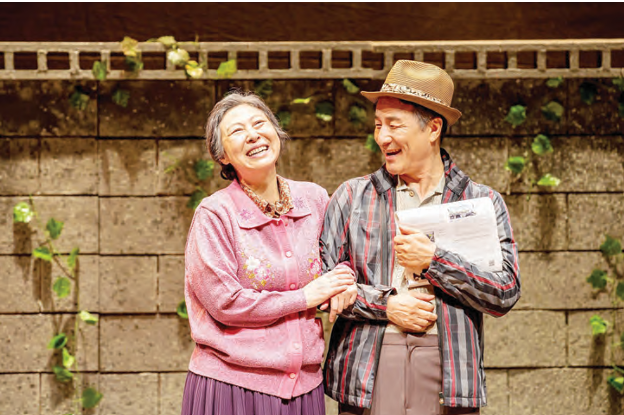A Korean staged cinema production ‘The Story of an Old Couple’ parallels the experience of the elderly in both Korean and Nigeria, while raising the question of how we treat the elderly in our societies.
Produced by Seoul Arts Center (SAC) On Screen, It is the story of how old couples – a widow and mother of three daughters, Yi Jeomsun (Cha Yoo-kyung) finds love, happiness and fulfilment with widower high fashion designer, Bak Dong-man (Kim Myung-gon).
Written and stage-directed by Wi Seong-sin, with Video Director, Shin Tae-yeon on as film recorder, the production centers around the themes of abandonment of the elderly, their exclusion and limitation of their social life which often leads to loneliness and depression, and a culture of unconscious judgement of old people who have a rich romantic life.
Oftentimes, the abandonment of the elderly is not intentional rather it is as result of their children growing up, and moving further away to go to school, work or are busy raising their own family. The problem in that in Asian and African societies where care of the elderly is largely an extended and immediate family responsibility, the high cost of living and ongoing fracturing of strong extended families into nuclear isolated ones, are leaving the elderly alone, depressed and in most cases in Nigeria, poverty-driven and ill-health.
Similarly, the absence of a healthy social life for elderly, either by the limitation of their contact with children and grandchildren, or community-based activities that test mental and physical capacity, leads to loneliness and depression amongst the older population. The audience sees Yi who hid her loneliness and need for companionship behind sarcasm and soft cursing blossom emotionally across three seasons with her love for the lively Dong-man.
But her emotional blooming came after her initial worry of what neighbours will think of her renting a separate room in house to a male, and her eventual romantic relationship with him. This highlights the culture of quiet disapproval in our societies of older people who have rich romantic lives. By rich, one does not mean multiple sexual partners, but just the interest in meeting, loving and marrying someone else their age. Society acts as though one loses the capacity for romantic feelings once they’re past a certain age.
Another theme which the staged movie addresses indirectly is the possibility of a cinematic/theatric career for the elderly to play their age. In fact, the actors who played the two main and sole characters in the play, proved so. For a two-man act, they effortlessly engaged the audience with their expressively and subtly acting talent. However, the exception of The Golden Girls, such opportunities to act their age are few and far between.
Commendations must go to playwright Wi Seong-sin and co-writer for filmed adaptation, Oh Young-min, whose witty, heartfelt and realistic dialogues complemented the actors brilliantly nuanced acting. One cries tears of joy with Yi upon her receiving a 24-carat gold ring from Bak, because they can relate where she is coming from – from being lonely and alone, with thoughts that her life was behind her, to suddenly being genuinely wooed, complemented and loved by someone, and finding a companion for however long she had to live.
The audience laughs at the couple’s razor-sharp wit and exchanges, as they bond and fall in love over their shared interest of cursing and the game of Go Stop. And even laugh, at Bak’s attaining his driver’s license at the fifth attempt amid a very emotional moment.
Props also go the production – another on of SAC on Screen peculiar recorded play – that deploys cinematic elements – combination of outside shots (to introduce the audience to Yi’s residence and to indicate the seasonal passage of time), and the recording of live stage performance. The stage setting to represent a courtyard or a view of a house from a street. And the exceptional lighting easily portrayed daylight, and to reflect nighttime just the manipulation of lights to reflect bolder shadows of the actors.
On the choice of the staged performance, KCCN SAC on Screen Supervisor, Gwang Min Lee, said its universal theme resonates across cultures, and encourages conversation about intergenerational understanding that is relevant in today’s fast-changing world.
“We hope the audience reflects on the value of long-term relationships. The film reminds us that small acts of care and communication can make a big difference, especially as people grow older. It also a gentle reminder to cherish our loved ones.”






